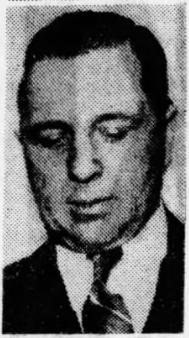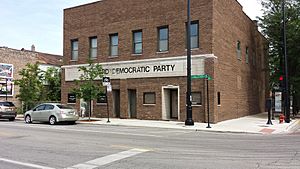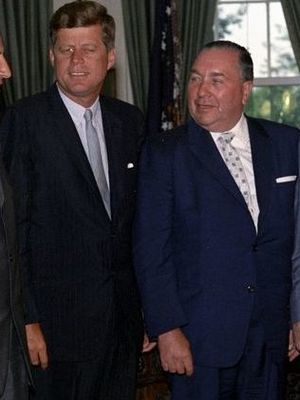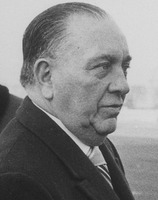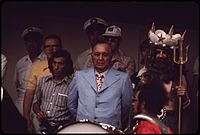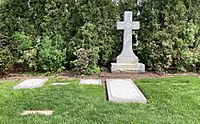Richard J. Daley facts for kids
Quick facts for kids
Richard J. Daley
|
|
|---|---|
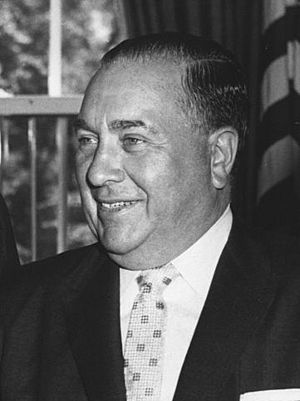 |
|
| 48th Mayor of Chicago | |
| In office April 20, 1955 – December 20, 1976 |
|
| Preceded by | Martin H. Kennelly |
| Succeeded by | Michael Bilandic |
| Chairman of the Cook County Democratic Party | |
| In office 1953–1976 |
|
| Preceded by | Joseph L. Gill |
| Succeeded by | George Dunne |
| 16th President of the United States Conference of Mayors | |
| In office 1959–1960 |
|
| Preceded by | Norris Poulson |
| Succeeded by | Richardson Dilworth |
| Cook County Clerk | |
| In office 1950–1955 |
|
| Preceded by | Michael J. Flynn |
| Succeeded by | Edward J. Barrett |
| Illinois Director of Revenue | |
| In office 1949–1950 |
|
| Governor | Adlai Stevenson II |
| Minority Leader of the Illinois Senate | |
| In office 1941–1946 |
|
| Member of the Illinois Senate from the 9th district |
|
| In office 1938–1946 |
|
| Preceded by | Patrick J. Carroll |
| Succeeded by | Thaddeus Adesko |
| Member of the Illinois House of Representatives from the 9th district |
|
| In office 1936–1938 |
|
| Preceded by | David Shanahan |
| Succeeded by | William Fucane |
| Personal details | |
| Born |
Richard Joseph Daley
May 15, 1902 Chicago, Illinois, U.S. |
| Died | December 20, 1976 (aged 74) Chicago, Illinois, U.S. |
| Resting place | Holy Sepulchre Cemetery |
| Political party | Democratic |
| Spouse |
Sis Guilfoyle
(m. 1936) |
| Children | 7, including Richard, John, and William |
| Relatives | Patrick R. Daley (grandson) Patrick Daley Thompson (grandson) |
| Education | DePaul University (LLB) |
Richard Joseph Daley (May 15, 1902 – December 20, 1976) was an American politician. He served as the Mayor of Chicago from 1955 until his death. He was also the leader of the Cook County Democratic Party from 1953.
Daley is known for helping Chicago avoid the problems that other large cities faced. He had strong support from Chicago's Irish Catholic community. Important politicians like Lyndon B. Johnson saw him as a key Irish-American leader. He also had close ties to the Kennedy family.
Daley played a big role in the Democratic Party. He supported John F. Kennedy in the 1960 presidential election. He also backed Hubert Humphrey in the 1968 election. He was Chicago's longest-serving mayor until his son, Richard M. Daley, broke his record in 2011.
However, Daley's time as mayor also faced criticism. This included his actions during the 1968 Chicago riots after Martin Luther King Jr. was assassinated. His handling of the 1968 Democratic National Convention in Chicago also drew strong reactions.
Contents
Early Life and Education
Richard J. Daley was born in Bridgeport, a working-class neighborhood in Chicago. He was the only child of Michael and Lillian Daley. His family came from Ireland during the Great Famine.
Richard's father was a quiet sheet metal worker. His mother, Lillian, was outgoing and spoke her mind. Before women could vote, Lillian was active in the suffragette movement. She often took her son to marches. She hoped he would have a very successful career.
Learning and Early Jobs
Daley went to Nativity of Our Lord elementary school. He then attended De La Salle Institute, where he learned office skills. He took night classes at DePaul University College of Law. He earned his law degree in 1933.
As a young man, Daley sold newspapers and made deliveries. He also worked in Chicago's Union stock yards to pay for law school. He spent his free time at the Hamburg Athletic Club. This club was a social and political group near his home. Daley became president of the club at age 22. He held this role until 1939.
Political Career Beginnings
Daley's political journey started when he became a Democratic precinct captain. This meant he helped organize voters in his local area. He also worked as a secretary for several Cook County Treasurers.
First Elected Roles
Daley's first elected job was in the Illinois House of Representatives. He was elected for the 9th district in 1936. Even though he was a lifelong Democrat, he was elected as a Republican. This happened because he took the place of a Republican candidate who had recently passed away.
After this election, Daley quickly returned to the Democratic Party. In 1938, he was elected to the Illinois Senate. He served as the Minority Leader of the Illinois Senate from 1941 to 1946. In 1946, he lost an election to become Cook County sheriff. This was his only political defeat.
In the late 1940s, Daley became the Democratic Ward Committeeman for the 11th Ward. He kept this position until his death. From 1949 to 1950, he led the Illinois Department of Finance. Then, in 1950, he successfully ran for Cook County Clerk. He held this job until he was elected mayor of Chicago.
In 1953, Daley became the chairman of the Cook County Democratic Party. This position gave him a lot of power. Holding this role along with being mayor later on made him even more influential.
Mayor of Chicago: Early Years
Daley was first elected mayor in 1955. He was Chicago's 48th mayor. He was reelected five times and served for 21 years until he died. During his time, Daley had great control over the city's politics.
Chicago officially has a "weak-mayor" system. This means the city council usually holds most of the power. However, Daley's strong leadership of the Chicago Democratic Party allowed him to guide the city firmly. He had a lot of influence over local political groups.
From 1959 to 1960, Daley was the president of the United States Conference of Mayors.
Daley helped John F. Kennedy win Illinois by a small margin in the 1960 presidential election.
Building a Modern Chicago
Many major construction projects happened during Daley's time as mayor. These included O'Hare International Airport, the Sears Tower, McCormick Place, and the University of Illinois at Chicago. Many expressways and subway lines were also built. O'Hare Airport was a special source of pride for Daley.
Daley's vision for a modern Chicago also involved racial separation. Roads, housing, and schools were often built to create boundaries between white and Black neighborhoods. To improve downtown Chicago, Daley worked with business leaders. They aimed to replace poorer Black residents with middle-class white people.
To prevent Black people from moving into white areas, Daley oversaw the building of public housing high-rise towers. These included the Robert Taylor Homes. They were placed in Chicago's Black neighborhoods. Many were on a single street on the South Side, creating a very dense area of public housing. Daley also made sure the Dan Ryan Expressway followed the traditional racial dividing line. This separated the public housing areas from white neighborhoods.
Until the late 1960s, Daley still had strong support (about 70%) from the Black community in city elections. Like other groups in Chicago, Black voters often supported the party in exchange for political favors.
Civil Rights Challenges
From late 1965 to early 1967, Mayor Daley faced the Chicago Freedom Movement. This movement aimed to improve conditions in Black neighborhoods. It fought for better schools and for open housing in Chicago. Martin Luther King Jr. led this campaign. He tried to use peaceful marches, similar to those in the South.
Daley, with help from Black political leaders and the local press, avoided violent clashes. In August 1966, a "Summit Agreement" was reached. This agreement led to the creation of the Leadership Council for Metropolitan Open Communities. While debated, many see the Chicago Freedom Movement as not fully successful.
Daley also discouraged filming movies and TV shows in Chicago. This policy started after a TV show episode in 1959 showed a Chicago police officer taking bribes. This rule lasted until his term ended. It was later changed by Mayor Jane Byrne, allowing movies like The Blues Brothers to film in the city.
1968 and Later Years
The year 1968 was very important for Daley. In April, he was criticized for his strong words after riots occurred following King's assassination.
In August, the 1968 Democratic National Convention was held in Chicago. This event was meant to show off Daley's achievements. Instead, it became famous for arguments and chaos. The nation was divided by the Vietnam War. The assassinations of King and Kennedy earlier that year added to the tension. Anti-war protesters came to Chicago, aiming to stop the convention.
Sometimes, clashes between protesters and police turned violent. Images of this chaos were shown on national television. Later, anti-war activists like Abbie Hoffman and Jerry Rubin were charged with inciting a riot. Their convictions were later overturned.
Public opinion polls after the convention showed that most Americans supported Daley's actions. Daley was re-elected for his fifth term in 1971. Some argue this was due to a lack of strong opponents. In 1972, Democratic nominee George McGovern removed Daley from the 1972 Democratic National Convention. He replaced Daley's group with one led by Jesse Jackson. This event showed a decrease in Daley's power within the Democratic Party. However, McGovern later tried to make amends.
In the 1970 special election, Daley supported adopting a new state constitution. His support was likely key in helping Illinois voters approve it. Daley strongly believed in home rule for local governments. This new constitution allowed local governments to have more control.
Daley was reelected mayor for a record sixth term in 1975.
Death and Family Life
On December 20, 1976, Daley collapsed while going to lunch. He was taken to his doctor's office. It was confirmed he had a massive heart attack. He was pronounced dead at 2:55 p.m. He was 74 years old.
Daley's funeral was held at Nativity of Our Lord, the church he attended since childhood. He is buried in Holy Sepulchre Cemetery in Worth Township, southwest of Chicago.
Personal Life and Family
Daley met Eleanor "Sis" Guilfoyle at a local ball game. They dated for six years. They married on June 17, 1936. They lived in a simple brick house in Bridgeport, near where he grew up.
They had seven children: three daughters and four sons. Their oldest son, Richard M. Daley, became mayor of Chicago in 1989. He served until 2011. Their youngest son, William M. Daley, worked for President Barack Obama and President Bill Clinton. Another son, John P. Daley, is a member of the Cook County Board of Commissioners.
Speaking Style
Daley never lost his Chicago accent. He was known for sometimes mixing up his words. In 1968, he famously defended police actions during the Democratic convention. He said, "Gentlemen, get the thing straight once and for all – the policeman isn't there to create disorder, the policeman is there to preserve disorder." His press secretary would tell reporters, "Write what he means, not what he says."
Legacy and Impact
In a 1993 survey, historians and experts ranked Daley as the fifth best American big-city mayor between 1820 and 1993. He was also ranked the best big-city mayor to serve after 1960. Historian Michael Beschloss called Daley "the pre-eminent mayor of the 20th century."
Chicago always had a good bond rating, even when other cities faced money problems. Journalists Adam Cohen and Elizabeth Taylor suggest Daley's policies might have saved Chicago from the same fate as cities like Detroit. They noted that for every middle-class neighborhood he helped, conditions worsened in a poorer one. For every skyscraper that kept jobs downtown, there was a housing project that kept poor people in crowded areas.
Many Chicagoans called Daley "Da Mare" (The Mayor) or "Hizzoner" (His Honor). After his death and his son Richard became mayor, the first Mayor Daley became known as "Boss Daley" or "Old Man Daley."
During the civil rights era, some Black Chicagoans called Daley "Pharaoh." This was because they saw him as a powerful and unyielding leader.
See also
- Timeline of Chicago, 1950s–1970s


